九年级上册英语Unit1 grammar知识讲解和练习-译林版(含答案)
Unit1语法详解专题练习牛津译林版九年级英语上册
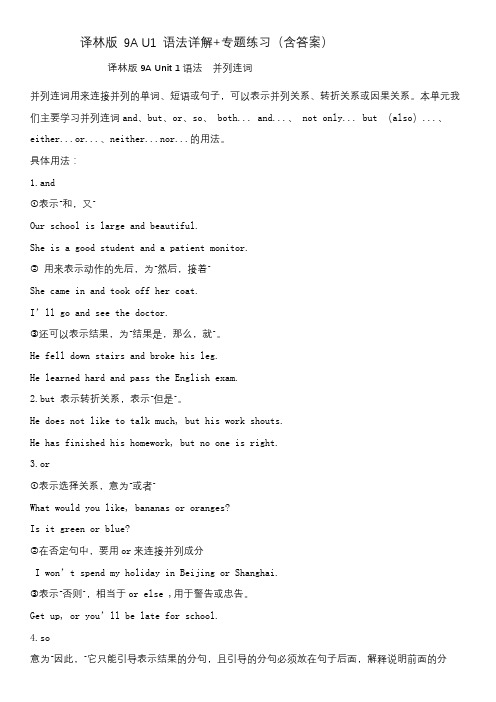
译林版9A U1 语法详解+专题练习(含答案)译林版9A Unit 1语法并列连词并列连词用来连接并列的单词、短语或句子,可以表示并列关系、转折关系或因果关系。
本单元我们主要学习并列连词and、but、or、so、 both... and...、 not only... but (also)...、either...or...、neither...nor...的用法。
具体用法:1.and①表示“和,又”Our school is large and beautiful.She is a good student and a patient monitor.②用来表示动作的先后,为“然后,接着”She came in and took off her coat.I’ll go and see the doctor.③还可以表示结果,为“结果是,那么,就”。
He fell down stairs and broke his leg.He learned hard and pass the English exam.2.but 表示转折关系,表示“但是”。
He does not like to talk much, but his work shouts.He has finished his homework, but no one is right.3.or①表示选择关系,意为“或者”What would you like, bananas or oranges?Is it green or blue?②在否定句中,要用or来连接并列成分I won’t spend my holiday in Beijing or Shanghai.③表示“否则”,相当于or else ,用于警告或忠告。
Get up, or you’ll be late for school.4.so意为“因此,”它只能引导表示结果的分句,且引导的分句必须放在句子后面,解释说明前面的分句。
新译林版英语九年级上册9A Unit1 Grammar

13. I think I can be a good teacher or a good
doctor. (P7)
14. Neither my parents nor I think I can
make a good accountant. (P7) 15. “He’s quiet and doesn’t like to talk
5. My cousin Annie’s bicycle is broken, so she’s going to ask someone to fix it. (牛津七年级下U2)
6. Now the living room has not only blue
walls but also a blue ceiling and floor. (牛津八年级上U4)
7. There are many big companies _a_n__d_ international banks here.
8. About 285 million people around the world are blind _o_r__ have eye problems, mostly in poor areas, ...
7. There are many big companies and
international banks here. (牛津八年级下U3)
8. About 285 million people around the
world are blind or have eye problems, mostly in poor areas, ... (牛津八年级下U7)
连词是一种连接词与 词,短语与短语以及 句与句的虚词, 它不 能独立担任句子成分 而只起连接作用。
_Grammar同步练习(含答案)2021-2022学年牛津译林初中英语九年级上册Unit1

Unit1 Grammar同步练习一、选用both...and..., either...or..., neither...nor...或not only... but also...填空1. ______ you _______ your brother can join us. We want one of you.2. —I would like you to talk about the Great Wall.一I’m sorry, but ______ Jack ______ I have been there.3. I am a fan of Liu Qian. ______ his magic _______ his humor attracts me.4. ______ my father ______ my mother believes what star signs say, but I do.5. —I hear _______ your grandpa _______ your grandma like watching Peking Opera.—Right, just as many old people do in Beijing.6. —Do you go to school by bus?—No, _______ Sandy ______ I take a bus to school. We live near our school.二、单项选择( )1.一Do you play _______ piano in your free time?—No, I like sports. I often play ______ soccer with my friends.A. /, theB. the, /C. the, theD. a, a( )2. The chemicals in the vegetables and fruit are bad ______ our health.A. fromB. withC. ofD. for( )3.一The meat is _______ delicious.—Yes, but don’t eat _______.A. too much, too muchB. much too, too muchC. too much, much tooD. much too, much too( )4. —How do you like the two pairs of shorts?—They don’t fit me well. They are ______ too long ______ too short.A. not only; but alsoB. both; andC. neither; norD. either; or( )5. It was raining heavily, _______ we decided to stay at home and watch TV.A. butB. orC. becauseD. so三、根据所给汉语完成下列句子,每空词数不限1.她为什么拒绝接受那件礼物呢?Why did she _____________ that gift?2.你做坏事前要三思。
九年级英语Unit 1 Grammar译林出版社知识精讲
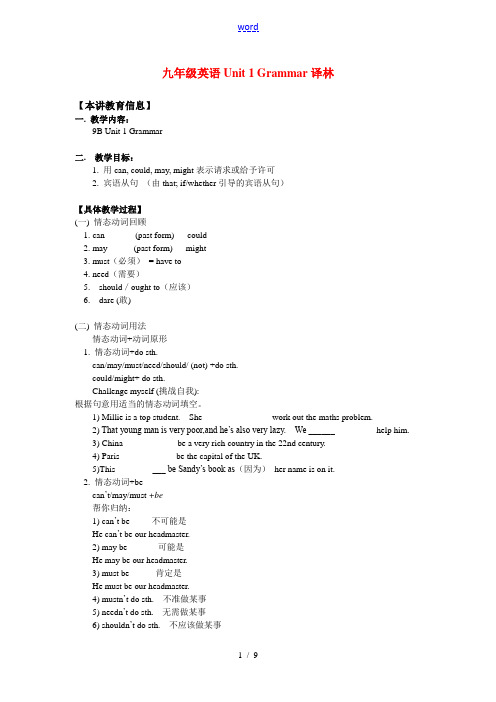
九年级英语Unit 1 Grammar译林【本讲教育信息】一. 教学内容:9B Unit 1 Grammar二. 教学目标:1. 用can, could, may, might表示请求或给予许可2. 宾语从句(由that; if/whether引导的宾语从句)【具体教学过程】(一) 情态动词回顾1. can (past form) could2. may (past form) might3. must(必须)= have to4. need(需要)5. should/ought to(应该)6. dare (敢)(二) 情态动词用法情态动词+动词原形1. 情态动词+do sth.can/may/must/need/should/ (not) +do sth.could/might+ do sth.Challenge myself (挑战自我):根据句意用适当的情态动词填空。
1) Millie is a top student. She _______________ work out the maths problem.2) That young man is very poor,and he’s also very lazy. We _______________ help him.3) China ____________be a very rich country in the 22nd century.4) Paris ____________ be the capital of the UK.5)This ___________ be Sandy’s book as(因为)her name is on it.2. 情态动词+becan’t/may/must +be帮你归纳:1) can’t be 不可能是He can’t be our headmaster.2) may be 可能是He may be our headmaster.3) must be 肯定是He must be our headmaster.4) mustn’t do sth. 不准做某事5) needn’t do sth. 无需做某事6) shouldn’t do sth. 不应该做某事ought not to do sth.比较句意:This may not be true.This cannot be true.Such things may happen.Such things can happen.It must have rained last night.极限挑战:1) The singer must be Pan Weibo. (否定句)The singer ______ (mustn’t/can’t)be Pan Weibo.2) ---Must we catch a bus there?a. (肯定回答)---Yes,you _________. (must/need)B. (否定回答)---No,you __________. (mustn’t/needn’t)You can also go there by bike.3) ---Could you help me with my drawing?---Yes, I could.---No, I couldn’t. (对吗?)小结:情态动词有can(could), may (might),must, shall , should, will (would),ought to, need, dare 等。
译林版九年级上册英语Unit 1 Gramar课时练习(含答案)
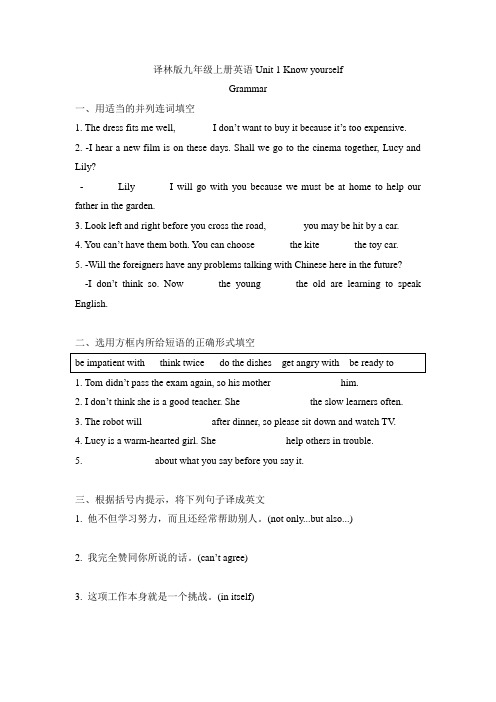
译林版九年级上册英语Unit 1 Know yourselfGrammar一、用适当的并列连词填空1. The dress fits me well, _______I don’t want to buy it because it’s too expensive.2. -I hear a new film is on these days. Shall we go to the cinema together, Lucy and Lily?-_______Lily_______I will go with you because we must be at home to help our father in the garden.3. Look left and right before you cross the road, _______you may be hit by a car.4. You can’t have them both. You can choose_______the kite_______the toy car.5. -Will the foreigners have any problems talking with Chinese here in the future?-I don’t think so. Now_______the young_______the old are learning to speak English.二、选用方框内所给短语的正确形式填空1. Tom didn’t pass the exam again, so his mother______________him.2. I don’t think she is a good teacher. She______________the slow learners often.3. The robot will______________after dinner, so please sit down and watch TV.4. Lucy is a warm-hearted girl. She______________help others in trouble.5. ______________about what you say before you say it.三、根据括号内提示,将下列句子译成英文1. 他不但学习努力,而且还经常帮助别人。
九年级上册英语Unit 1 Know yourself Grammar讲解-译林版

Unit 1 Know yourselfGrammarA:连词的用法连词的定义:用来连接词、短语或句子的词。
eg: Joan was rich, beautiful and proud. (and连接单词)He likes to play football and sing popular songs.(and连接短语)Go straight on and you will see the church. (and连接句子)连词的分类考点一:and/ but /or/ so(1)and:和;而且;又;然后①表示联合,意为“和、又、而且”有时用于连接两个相同的词语,表示事物连续性eg:The train ran faster and faster.②and这样的话,就会……,相当于一个肯定条件句eg:Study hard, and you can get good grades.(If you study hard, you can get good grades.)(2)or:或;否则①or 否则相当于一个否定条件句。
eg: Hurry up, or you’ll be late.(If you don't hurry up, you'll be late.)or 或者(非否定句中)、和(否定句中)eg:You can take some food or some money.I don’t like reading or writing.(3) 表转折的连词but ,howeverbut口语常用词,语气较强,泛指与前述情况相反。
后没有逗号,直接连接分句;eg:Mr Mott is very poor, but he feels happy. Mott先生很穷,但他感到快乐。
(4)so 所以①so可以用作连词,表示“因此,所以”。
eg: I heard some noise outside, so I went out of the room to see why.②so that作为连词词组,表示“以便,为了”。
Unit1+grammar知识点+2022-2023学年牛津译林版九年级英语上册

1.I can be a good teacher or a good doctor.我能够成为一名好老师或者一名好医生。
or或者,连词;否则,连词I usually read books in the library or play basketball on the playground at the weekend.周末我总是在图书看书或者在操场打篮球。
Work hard,or you’ll fall behind others.努力学习,否则你会落后于人。
believe it or not信不信由你either ... or ...或者...或者...;要么...要么...2.He does not like singing or dancing.他不喜欢唱歌,也不喜欢跳舞。
3.Billy would not accept others’ advice.Billy不愿意接受其它人的建议。
(1)would会,将,will的过去式;愿意,动词would do sth将会做某事;愿意做某事would not do sth将不会做某事;不愿意做某事would not accept others’ advice不愿意接受别人的建议Would you please do ...?你能做...?你愿意做...?Would you please open the window?你能开一下窗户吗?你愿意开一下窗户吗?(2)accept接受,及物动词accept the invitation接受邀请(3)advice建议,不可数名词-advise建议,动词give advice提供建议=offer adviceask for advice征求意见ask for advice from ...像某人征求意见good advice好建议What good advice!多好的建议啊!advice on ...关于...的建议advice on how/ways to sleep well关于好好睡觉的建议advise sb to do sth建议某人做某事advise us to take the underground there建议我们乘坐地铁去那里4.Billy would not think twice.Billy不愿意三思。
牛津译林版九年级英语上册Unit1知识点梳理汇总(含答案)
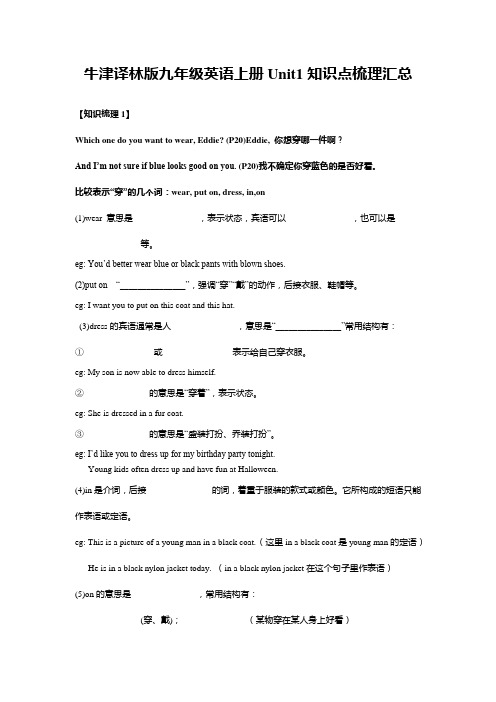
牛津译林版九年级英语上册Unit1知识点梳理汇总【知识梳理1】Which one do you want to wear, Eddie? (P20)Eddie, 你想穿哪一件啊?And I’m not sure if blue looks good on you. (P20)我不确定你穿蓝色的是否好看。
比较表示“穿”的几个词:wear, put on, dress, in,on(1)wear 意思是_______________,表示状态,宾语可以_______________,也可以是_______________等。
eg: You’d better wear blue or black pants with blown shoes.(2)put on “_______________”,强调“穿”“戴”的动作,后接衣服、鞋帽等。
eg: I want you to put on this coat and this hat.(3)dress的宾语通常是人_______________,意思是“_______________”常用结构有:①_______________ 或_______________表示给自己穿衣服。
eg: My son is now able to dress himself.②_______________的意思是“穿着”,表示状态。
eg: She is dressed in a fur coat.③_______________的意思是“盛装打扮、乔装打扮”。
eg: I’d like you to dress up for my birthday party tonight.Young kids often dress up and have fun at Halloween.(4)in是介词,后接_______________的词,着重于服装的款式或颜色。
它所构成的短语只能作表语或定语。
牛津译林版九年级上册英语 Unit 1知识点和练习(word版含答案)
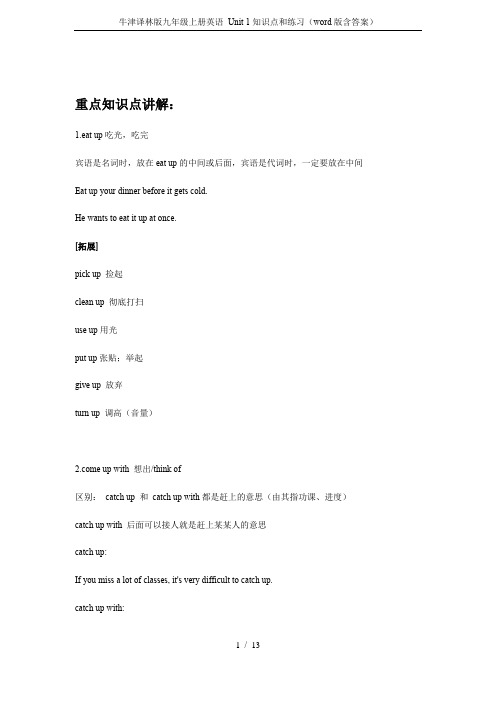
重点知识点讲解:1.eat up吃光,吃完宾语是名词时,放在eat up的中间或后面,宾语是代词时,一定要放在中间Eat up your dinner before it gets cold.He wants to eat it up at once.[拓展]pick up 捡起clean up 彻底打扫use up用光put up张贴;举起give up 放弃turn up 调高(音量)e up with 想出/think of区别:catch up 和catch up with都是赶上的意思(由其指功课、进度)catch up with 后面可以接人就是赶上某某人的意思catch up:If you miss a lot of classes, it's very difficult to catch up.catch up with:At the moment our technology is more advanced, but other countries are catching up with us.例题. Simon is creative enough__________new ideas.A come up with B. to come up with C come out with D. come down with答案:B3.praise n. 表扬,赞扬(不可数名词)vt..赞扬praise sb. for sth. 表扬某人某事Proud骄傲的,自豪的(形容词),pride骄傲,自豪(名词)。
be proud of 以...为荣; 以...自豪take pride in 以...自豪同样的意思,但可以看出名词和形容词的用法是有差异的。
形容词前用be动词.4.attentionpay attention to 后面可以直接加名词、代词或者动名词,但是值得我们注意的是,这里的to 是一个介词,并不是能构成动词不定式的,这和look forward to是一样的。
译林版九年级上册英语Unit1Grammar单词及短语(含答案)

译林版九年级上册英语Unit1Grammar单词及短语(含答案)译林版九年级上册英语Unit 1 Know yourselfGrammar一、单词1. 不耐烦的,急躁的adj. _______ 反义词_______2. 杰出的,极好的adj. _______二、短语及句子1. 洗碗____________2. 三四而行_______________3. 生别人的气_________________4. 过度焦虑___________________5. 焦虑太多而睡不香_______________6. 知道个性的类型_________________7. 犯太多的错误___________________8. 花太多的时间下棋、聊天______________9. 接受他人的建议______________________10. 寻找一些更好或不同的东西___________________11. 对孩子没有耐心_____________________12. 为我们做中饭_______________________13. 互相聊天___________________________14. 帮助某人打扫房间___________________15. 为某人购物_________________________16. 跟孩子打交道_______________________17. 成为一名优秀的老师_________________18. 适合当艺术家_______________________19. 对……有/无耐心_____________________20. 自信又精力充沛______________________21. 我恐怕……__________________________22. 有足够信心做某事____________________23. Jim和他表弟都没去过长城。
九年级上册英语Unit1 grammar知识讲解和练习-译林版(含答案)
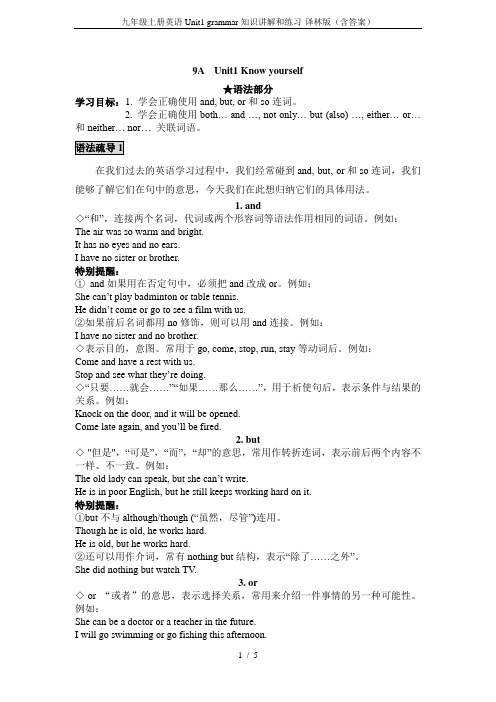
9A Unit1 Know yourself★语法部分学习目标:1. 学会正确使用and, but, or和so连词。
2. 学会正确使用both… and …, not only… but (also) …, either… or…和neither… nor… 关联词语。
在我们过去的英语学习过程中,我们经常碰到and, but, or和so连词,我们能够了解它们在句中的意思,今天我们在此想归纳它们的具体用法。
1. and◇“和”,连接两个名词,代词或两个形容词等语法作用相同的词语。
例如:The air was so warm and bright.It has no eyes and no ears.I have no sister or brother.特别提醒:①and如果用在否定句中,必须把and改成or。
例如:She can’t play badminton or table tennis.He didn’t come or go to see a film with us.②如果前后名词都用no修饰,则可以用and连接。
例如:I have no sister and no brother.◇表示目的,意图。
常用于go, come, stop, run, stay等动词后。
例如:Come and have a rest with us.Stop and see what they’re doing.◇“只要……就会……”“如果……那么……”,用于祈使句后,表示条件与结果的关系。
例如:Knock on the door, and it will be opened.Come l ate again, and you’ll be fired.2. but◇ "但是",“可是”,“而”,“却”的意思,常用作转折连词,表示前后两个内容不一样、不一致。
例如:The old lady can speak, but she can’t write.He is in poor English, but he still keeps working hard on it.特别提醒:①but不与although/though (“虽然,尽管”)连用。
【最新】牛津译林版九年级英语上册UNIT 1单元知识点归纳及练习题(含答案)
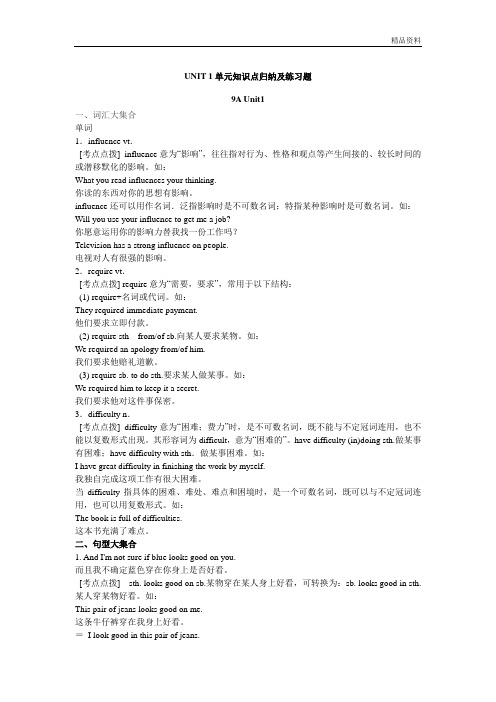
UNIT 1单元知识点归纳及练习题9A Unit1一、词汇大集合单词1.influence vt.[考点点拨] influence意为“影响”,往往指对行为、性格和观点等产生间接的、较长时间的或潜移默化的影响。
如:What you read influences your thinking.你读的东西对你的思想有影响。
influence还可以用作名词.泛指影响时是不可数名词;特指某种影响时是可数名词。
如:Will you use your influence to get me a job?你愿意运用你的影响力替我找一份工作吗?Television has a strong influence on people.电视对人有很强的影响。
2.require vt.[考点点拨] require意为“需要,要求”,常用于以下结构:(1) require+名词或代词。
如:They required immediate payment.他们要求立即付款。
(2) require sth from/of sb.向某人要求某物。
如:We required an apology from/of him.我们要求他赔礼道歉。
(3) require sb. to do sth.要求某人做某事。
如:We required him to keep it a secret.我们要求他对这件事保密。
3.difficulty n.[考点点拨] difficulty意为“困难;费力”时,是不可数名词,既不能与不定冠词连用,也不能以复数形式出现。
其形容词为difficult,意为“困难的”。
have difficulty (in)doing sth.做某事有困难;have difficulty with sth.做某事困难。
如:I have great difficulty in finishing the work by myself.我独自完成这项工作有很大困难。
Unit1(GrammarAB)语法讲解练习牛津译林版英语九年级上册

9AUnit1---GrammarA并列连词and/but/or/so的用法。
一、and、or、but、so 的基本用法:★and: ①表并列关系:“和、并且、又”;(and 在否定句中改为or)。
We use"and”to join ideas that are similar. e.g.:Daniel is modest and never shows off.I am active and energetic,and I love working with people.②用于祈使句,表结果,and 通常是比较好的结果。
e.g.:Try your best,and you’ll make more progress.★but:表转折关系:“但是”;(不能和(al)though同时使用)。
(al)though用于表示原因的句子前,but用于表示结果的句子前。
We use"but" to join ideas that are different. Attention: We can never use but and (al)though together. e.g.:◆Although/Though I have passed the exam, I am not pleased with the result.=I have passed the exam, but I am not pleased with the result.◆He doesn't like to talk much, but his work shouts.= Although/Though he doesn't like to talk much, his work shouts.★or: ①表选择关系:“或者”;We use "or" to introduce another possibility. e.g.:I can be a good teacher or a good doctor.Which do you like better, apples or pears?②表并列关系:“和、并且、又”;在否定句中or表并列关系。
牛津译林英语 九年级上册Unit1Grammar

4. neither…nor… “既不……也不……”, 具有否定含义。 当neither…or…连接两个主语时,谓语动 词遵循“就近原则” 。
e.g. Billy has not finished his homework. Daniel has not finished his homework. Neither Billy nor Daniel has finished his homework.
4. Suzy worries too much. She cannot sleep well sometimes. _S_u_z_y__w_o_r_r_ie_s_t_o_o__m_u_c_h_,_s_o__sh__e_c_a_n_n_o_t____ _s_le_e_p__w_e_ll__so_m__e_t_im__e_s._________________
I can be a good teacher. I can be a good doctor.
I can be a good teacher or a good doctor.
Conclusion: We use or to introduce another possibility. 我们用or去引出另一种可能性,or在这里 是“或者”的意思,表达选择关系。
1. __N_e_i_th__e_r_ my dad __n_o_r__ my mum
goes to work at the weekend. We visit my grandparents on Saturdays.
2. __B_o_t_h____ my mum _a_n_d___ my grandma
Suzy: What about Simon? Amy: He's active and good at playing football.
牛津译林版九年级上册9A Unit 1 Know yourself——Grammar练习及答案
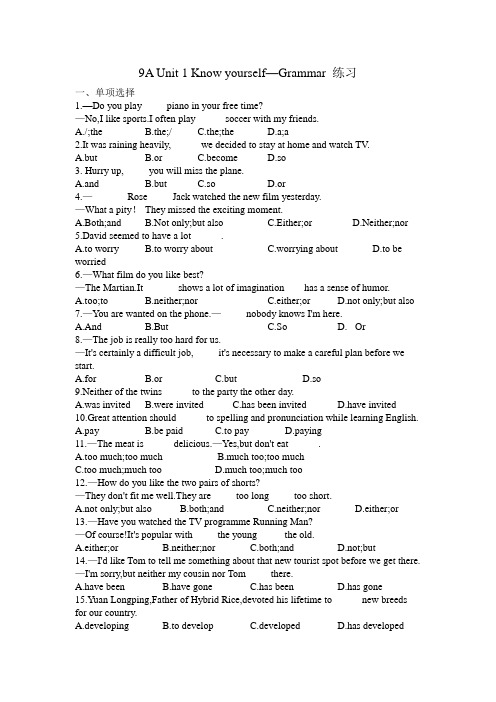
9A Unit 1 Know yourself—Grammar 练习一、单项选择1.—Do you play_____piano in your free time?—No,I like sports.I often play______soccer with my friends.A./;theB.the;/C.the;theD.a;a2.It was raining heavily,______we decided to stay at home and watch TV.A.butB.orC.becomeD.so3. Hurry up,_____you will miss the plane.A.andB.butC.soD.or4.—_______Rose_____Jack watched the new film yesterday.—What a pity! They missed the exciting moment.A.Both;andB.Not only;but alsoC.Either;orD.Neither;nor5.David seemed to have a lot______.A.to worryB.to worry aboutC.worrying aboutD.to be worried6.—What film do you like best?—The Martian.It_______shows a lot of imagination____has a sense of humor.A.too;toB.neither;norC.either;orD.not only;but also7.—You are wanted on the phone.—_____nobody knows I'm here.A.AndB.ButC.SoD. Or8.—The job is really too hard for us.—It's certainly a difficult job,_____it's necessary to make a careful plan before we start.A.forB.orC.butD.so9.Neither of the twins______to the party the other day.A.was invitedB.were invitedC.has been invitedD.have invited10.Great attention should______to spelling and pronunciation while learning English.A.payB.be paidC.to payD.paying11.—The meat is______delicious.—Yes,but don't eat______.A.too much;too muchB.much too;too muchC.too much;much tooD.much too;much too12.—How do you like the two pairs of shorts?—They don't fit me well.They are_____too long_____too short.A.not only;but alsoB.both;andC.neither;norD.either;or13.—Have you watched the TV programme Running Man?—Of course!It's popular with_____the young _____the old.A.either;orB.neither;norC.both;andD.not;but14.—I'd like Tom to tell me something about that new tourist spot before we get there. —I'm sorry,but neither my cousin nor Tom_____there.A.have beenB.have goneC.has beenD.has gone15.Yuan Longping,Father of Hybrid Rice,devoted his lifetime to______new breeds for our country.A.developingB.to developC.developedD.has developed二、词汇应用17.The pretty girl tried to catch the director's_________(注意).18.Peter often gets low marks in English because of his__________(粗心).19.She can't be a nurse or a teacher ,because she is too_________(patient).20.You can either accept others' advice or think________(two).三、动词填空21.——Look!Nora_________(take)the lead in the running race.—Yes,she is good at running.22.He is a warm-hearted person.He _________(respect)by all the people in the town.23.You should pay attention to_________(listen)to the teacher carefully.24.Neither he nor his parents_______(see)the film so far.25.If you don't work hard,you_________(ask)to leave sooner or later.四、完成句子26.每天不是她就是她妹妹洗碗。
牛津译林版英语九年级上册Unit 1 Know yourself --Grammar语法练习

Unit 1 Know yourselfGrammarⅠ.用适当的连词填空1. This is our first lesson, I don't know all your names.2. Take an umbrella with you, you' ll get wet.3. Use your head, you' ll find a way.4. Jack Peter likes playing football. They think it's exciting.5. his sister his mother like watching TV programmes.6. You may go out with me stay at home with Grandma.7. Lisa Lucy is interested in Maths. They think it's boring.Ⅱ.单项选择1. I' ve wanted to read Peter Pan for long, today I finally borrowed the book from the library.A. orB. butC. andD. since2. English study really takes me a lot of energy and time, it's worth it.A. andB. butC. soD. or3.“Put on your coat, you will catch a cold!”This is what my mum often says to me.A. andB. butC. orD. so4. Neither Kate nor her cousin to Russia, but of them have known the country very well.A. have been; neitherB. have gone; eitherC. has been; bothD. has gone; both5. There is only one position. The boss has to choose Jim Bruce to be the manager.A. not only; but alsoB. both; andC. either; orD. neither; nor6. —What's the weather like in Kunming, Lucy?—It's hot cold. So Kunming is called“the Spring City”.A. neither; norB. not only; but alsoC. either; orD. both; and7.—Do you think David and Lisa can be good accountants?—Accountants should be careful enough. David Lisa is suitable,I'm afraid.A. Either; orB. Neither; norC. Both; andD. Not only; but alsoⅢ.句子翻译1. 这次事故会让他对独自登山三思而行。
Unit 1 Grammar 牛津译林版英语九年级上册讲义 (含答案)-最新

Unit 1 Grammar 牛津译林版英语九年级上册讲义【知识梳理1】并列连词and, but, or 和so的用法。
由并列连词(and, so, but, or等)把两个或两个以上互不依从,但意思紧密联系的简单句连在一起而构成的句子叫做并列句。
其结构一般是:简单句+并列连词+简单句。
其中,and表示并列关系(和)或者顺承关系(不翻译),but表示转折关系(但是),or 表示选择关系(或者,还是)或让步关系(否则,要不然),so表示因果关系(所以)。
一、and的用法(1)and表示顺承或递进关系,意为“又,和”,用来连接两个或两个以上的单词,短语或者句子。
They have two boys and a girl. 他们有两个儿子和一个女儿。
(2)and 连接的并列成分作主语时,谓语动词通常用复数。
Amy and Daniel are good students. Amy和Daniel都是好学生。
(3)如果and连接的名词表达的是同一个人、同一事物或同一概念,则两个名词共用一个限定词。
The singer and dancer was present at the party today..(the singer and dancer指的是一个人既是歌手又是舞者。
)A knife and fork is on the table.(a knife and fork意思是副刀叉)二、or的用法(1)or表示选择关系,意为“或者”,当连接两个主语时,谓语动词与or后面的主语在人称和数上面保持一致,也就是说or后面的谓语动词是就近原则。
Would you like tea or coffee? 你喝茶还是喝咖啡?He or you are going to see the movie with us.他或者你可以和我们一起去看电影。
(2)or表示让步关系,意为“否则,要不然”,句型结构一般为:祈使句+or+陈述句。
- 1、下载文档前请自行甄别文档内容的完整性,平台不提供额外的编辑、内容补充、找答案等附加服务。
- 2、"仅部分预览"的文档,不可在线预览部分如存在完整性等问题,可反馈申请退款(可完整预览的文档不适用该条件!)。
- 3、如文档侵犯您的权益,请联系客服反馈,我们会尽快为您处理(人工客服工作时间:9:00-18:30)。
9A Unit1 Know yourself★语法部分学习目标:1. 学会正确使用and, but, or和so连词。
2. 学会正确使用both… and …, not only… but (also) …, either… or…和neither… nor… 关联词语。
在我们过去的英语学习过程中,我们经常碰到and, but, or和so连词,我们能够了解它们在句中的意思,今天我们在此想归纳它们的具体用法。
1. and◇“和”,连接两个名词,代词或两个形容词等语法作用相同的词语。
例如:The air was so warm and bright.It has no eyes and no ears.I have no sister or brother.特别提醒:①and如果用在否定句中,必须把and改成or。
例如:She can’t play badminton or table tennis.He didn’t come or go to see a film with us.②如果前后名词都用no修饰,则可以用and连接。
例如:I have no sister and no brother.◇表示目的,意图。
常用于go, come, stop, run, stay等动词后。
例如:Come and have a rest with us.Stop and see what they’re doing.◇“只要……就会……”“如果……那么……”,用于祈使句后,表示条件与结果的关系。
例如:Knock on the door, and it will be opened.Come l ate again, and you’ll be fired.2. but◇ "但是",“可是”,“而”,“却”的意思,常用作转折连词,表示前后两个内容不一样、不一致。
例如:The old lady can speak, but she can’t write.He is in poor English, but he still keeps working hard on it.特别提醒:①but不与although/though (“虽然,尽管”)连用。
Though he is old, he works hard.He is old, but he works hard.②还可以用作介词,常有nothing but结构,表示“除了……之外”。
She did nothing but watch TV.3. or◇ or “或者”的意思,表示选择关系,常用来介绍一件事情的另一种可能性。
例如:She can be a doctor or a teacher in the future.I will go swimming or go fishing this afternoon.◇选择疑问句中用or, “还是”的意思。
例如:Do you like apples or pears?Would you like tea or coffee?◇“祈使句+or +陈述句”,“……,否则……”的意思。
例如:Hurry up, or you will be late.Work hard, or you cannot pass this exam.4. so◇so用作连词时,主要用于表结果,意为“所以”,“因此”。
例如:It’s very cold, so you’d better wear a heavy coat.Th e door was locked, so we couldn’t get in.The class began at seven, so we should hurry up.特别提醒:“因为…所以…”不可以用because…so…结构,so不可以和because连用。
例如:错误:Because he was ill, so he couldn't come.正确:Because he was ill, he couldn't come.正确:He was ill, so he couldn't come.Ⅰ. 用and, but, or 或so 填空。
1. Do it yourself _______ ask someone to help you.2. The math problem is hard, _______ they can work it out..3. It’s our first travel, _______ we’re all happy.4. I’m sorry to tell you he is short _______ strong.5. We can’t live in the moon because there is no air ____ water on it.参考答案:1. or2. but3. so4. and5. orⅡ.把下面两个句子用正确的连词连接起来。
1. It is hot today. Some boys are still playing basketball outside.__________________________________________________________.2. Be careful! You will hurt yourself!______________________________________________________.3. Nancy worked hard at English. She came first in the English exam._________________________________________________________.4. He looks tall and strong. He is afraid to go out at night.______________________________________________________.5. The Summer Palace is large. It is also beautiful.____________________________________________________.参考答案:1. It is hot today, but some boys are still playing basketball outside.2. Be careful! or you will hurt yourself!3. Nancy worked hard at English, so she came first in the English exam.4. He looks tall and strong, but he is afraid to go out at night.5. The Summer Palace is large and beautiful.Ⅲ. 选择填空。
( ) 1. We didn't enjoy the picnic _______ there was a sudden rain.A. ifB. butC. becauseD. however( ) 2. Work hard, _____ you won’t pass the English exam this time.A. andB. soC. butD. or( ) 3. His Dad should beat him for his done. ______, he praised him.A. soB. andC. InsteadD. But( ) 4. Her uncle gave her a new bike as her birthday present______ she liked it very much.A. andB. butC. soD. or( ) 5. – What would you like to drink, juice ______ Coke?– Some juice, please.A. andB. orC. eitherD. but参考答案:1—5 CDCAB1. both … and …◇“两者都”、“…和…都”的意思,用以说明或强调某一件事情、某一个人或某一状况与另一件事情、另一个人或另一状况相同。
例如:Both Li Ming and Wei Hua are good at English.Our English teacher both speaks and writes French.The food was both bad and tasted badly.特别提醒:b oth… and …, 连接两个成分作主语时,谓语总是用复数。
例如:Both she and I are good at English.Both teaching and research teaching are not easy work.2. not only… but (also) …◇“不但…而且…”、“不仅…而且…”的意思,在句中用以连接两个主语、连接两个不同的谓语动词、连接两个不同的宾语、连接两个表语。
例如:Not only I but also my parents are fond of watching the film.Not only Lucy but also Lily is good students in our school.He not only has a car but also drives on his ownI not only know English but (also) Russian.Shakespeare was not only a writer but (also) an actor特别提醒:①由于not only A but also B句式的重点在B上,在汉语的意思上等同于both…and …,但要与both… and …区别开来。
例如:Not only she but (also) her brother likes playing the piano.Both he and she are going to see English teacher.Not only our school but also his school attends the sports meeting.=Both our school and his school attend the sports meeting.②n ot only…but also…连接的两个谓语动词一般不重复,这与汉语不同。
